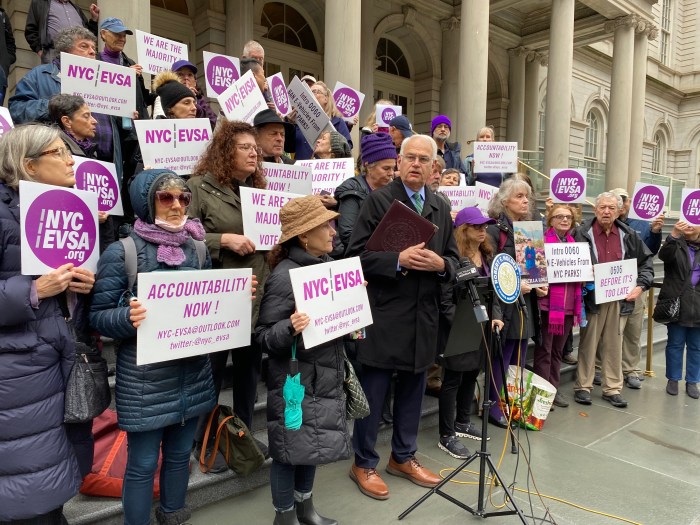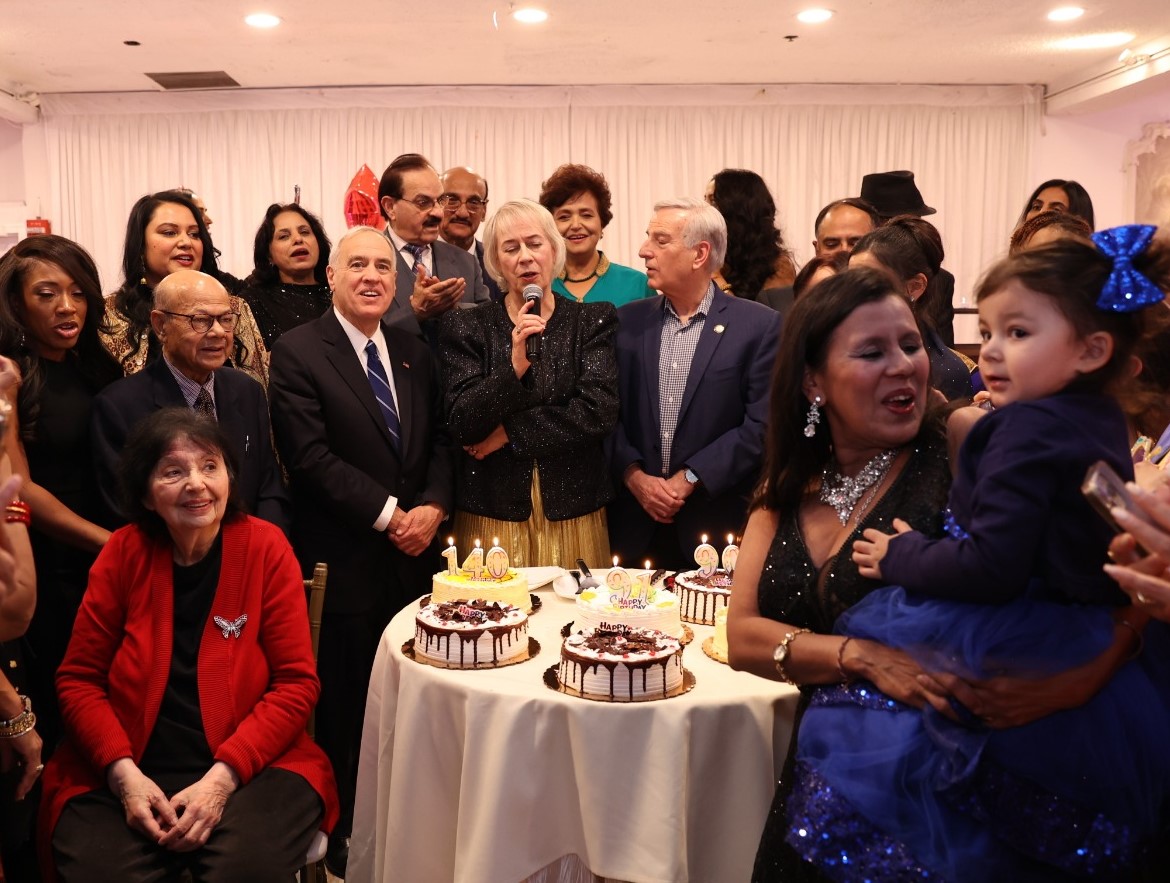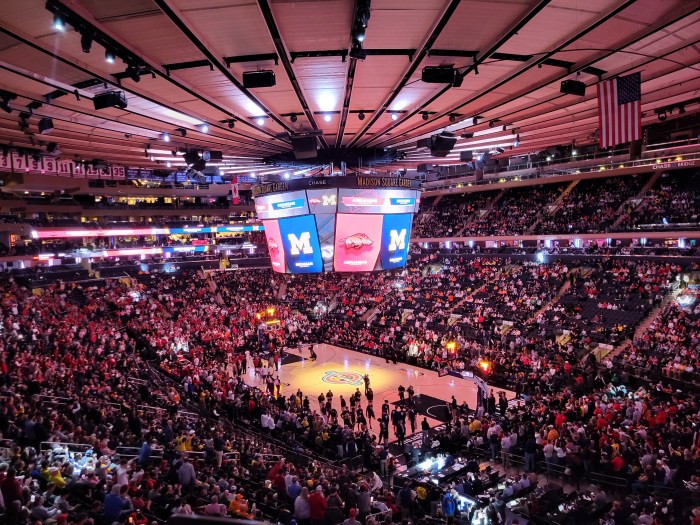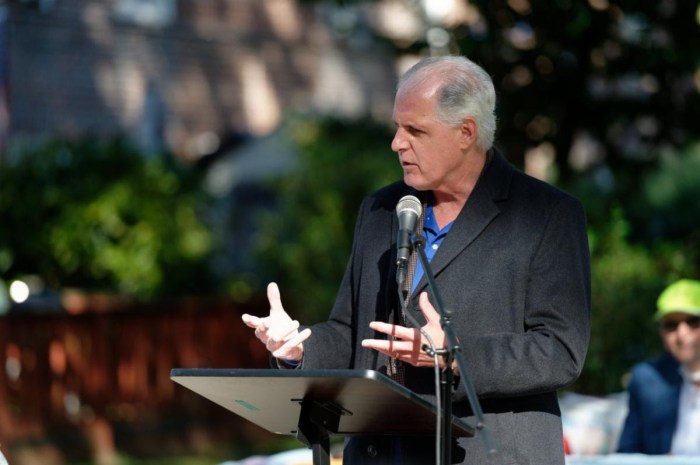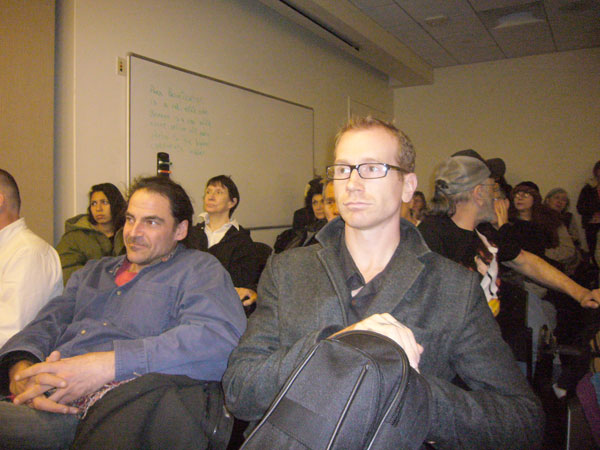 [/media-credit]
[/media-credit]
The lone supporter was Bill Castro, Manhattan borough Parks Department commissioner, who told a packed audience that the recently enforced rules still allow buskers plenty of room to perform in Washington Square — as long as they’re 50 feet from any monument and 5 feet from a bench.
“The rules are not intended to ban performers from this or any other park, regardless of whether they solicit or accept contributions,” Castro said.
“The department seeks to regulate and accommodate a variety of activities and uses,” Castro added, but he promised that the department would review and reconsider the enforcement policy that began in the park around May. The rules only apply to buskers, meaning performers who accept cash contributions.
Given that Washington Square, the spawning ground in decades past of music luminaries including Bob Dylan, Judy Collins and Joan Baez, has benches along its paths and large monuments, including the iconic arch, the central fountain, the Garibaldi statue and the monument to Alexander Lyman Holley, the claim of “plenty of room” rang hollow.
All others at the Dec. 19 speak-out, sponsored by Community Board 2 and its Parks Committee, called for an end to what they called an anti-life and hypocritical enforcement effort.
Indeed, one speaker, Mitchel Cohen, mocked the rules, saying he was in favor of barring musicians because they interrupted the sound of jackhammers and sirens and they prevented people from getting close to the monuments.
“Everybody knows that people come to Washington Square Park from all over the world to see the Holley Monument,” Cohen quipped.
Gregory Nissen, a theater composer and pianist, introduced himself as Robert Zimmerman who just blew in from Minneapolis with his banjo, but decided to leave because the cops wouldn’t let him play in Washington Square.
Katie Kat, a soprano and voice instructor at New York University who performs under the arch (“great acoustics”) with her partner, Roxanne Walitzki, sang part of an aria from Puccini’s “La Bohème” at the end of her remarks and won admiring applause.
C.B. 2 members Keen Berger and Doris Diether, both speaking as individuals, urged an end to the enforcement.
Berger, a resident near Washington Square for 47 years, said she has visited the park at least 2,000 times. She said she cherished the music and didn’t recall negative reactions against performers.
Diether reminded the forum that performance in Washington Square dates back more than 50 years.
“This is ridiculous,” Diether said about the enforcement, which she recalled started two or three months ago. “First, they said that musicians were blocking the pathways. Then, they said there was no solicitation in the park. The rules are idiotic and the Parks commissioner [Adrian Benepe] should be told they’re idiotic and they should be thrown out,” Diether said.
“The people who perform are the people who keep the park safe,” said Susan Goren, a regular parkgoer known as “The Squirrel Whisperer.” The rules, she said, are eliminating what people find joyful in the park.
A longtime jazz performer known as Black Bobby said, “First they came for the black folks. Now, from the look of the audience here tonight [largely white], it seems that there is equality.”
Norman Siegel, a civil rights lawyer, recalled that he came from Brooklyn to Manhattan in 1965 to study at New York University Law School on Washington Square South. He said he was concerned that the Bloomberg administration was targeting free expression in the parks — in Zuccotti Park [previously, the site of the Occupy Wall Street encampment] and Washington Square Park. Noting that the U.S. Supreme Court has held that music is protected under the First Amendment, Siegel threatened that another lawsuit was likely unless the city narrowed the scope of its parks rules.
Robert Lederman, president of A.R.T.I.S.T. (Artists’ Response To Illegal State Tactics), reminded the meeting that he has a pending federal lawsuit challenging the city’s rules limiting where artists can vend art and other expressive matter in Union Square, on the High Line and in Central Park and Battery Park. The rules were only imposed on musicians, according to Lederman, after he raised the issue to Parks that musicians were excluded from the Union Square limits, while vendors were forced to abide by them.
Lederman, who cited an editorial, “Don’t ban the buskers” in last week’s issue of The Villager, said the rules practically ban artists and musicians from any New York City park.
The activist said the hypocrisy of the rules is apparent from the city-sponsored holiday markets that pre-empt space in Union Square and other parks.
Lorie Moody, a resident of 2 Fifth Ave., agreed, citing the Greenmarket in Union Square and “the less-than-glorious, white-tented event in Washington Square,” referring to the annual Taste of The Village event under the Washington Square arch.
Colin Huggins, “The Crazy Piano Guy,” who wheels his piano to play in Washington Square and other parks, said he has received summonses that would cost more than $2,000 in fines if they are not eventually dismissed. He said his playing brings people together.
Joe Mangrum, who does sand painting in Union Sq. and Washington Square, has also received numerous summonses.
“New York City is unique because there is this creative freedom,” Mangrum said. The city, he said, appears to be “militarizing’” the park.
“Freedom is the most important thing we have. If you don’t have that you don’t have a country,” Mangrum said.
Ryo Sasaki, a jazz trumpeter, said he came to New York four years ago from Japan because of the music culture. He has been playing in Washington Square Park for three years, “and suddenly this season we cannot do it anymore,” he said. “I learned to play music in school but I never learned how to entertain and communicate with people. Those skills I learned in Washington Square Park,” Sasaki said.
“The city crated a problem that never existed,” said Natalie Albert, a neighborhood resident for 40 years.
Tobi Bergman, chairperson of the board’s Parks Committee, called for speakers supporting the parks rules at the end of the two-hour forum, but there were no takers. Pros and cons may weigh in online at www.washingtonsquarespeakout.com .
“I take it as a good sign that the enforcement could change,” said Brad Hoylman, C.B. 2 chairperson, citing Castro’s assurance that the department would reconsider the policy. Earlier this year, Board 2 opposed the Parks Department’s limits on vendors of expressive matter in the four Manhattan parks.
“That was even before we knew that musicians would be summonsed,” Hoylman said.



